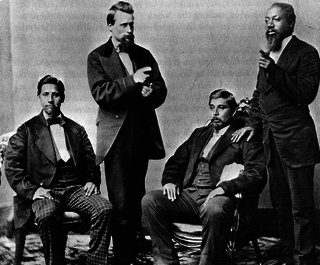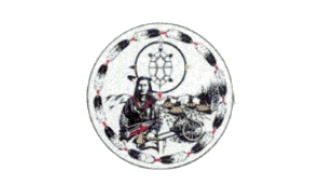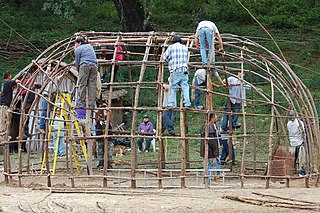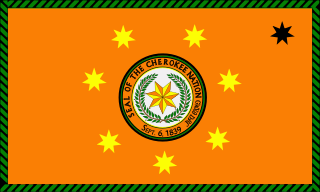Related Research Articles

Native Americans, sometimes called American Indians, First Americans, or Indigenous Americans, are the Indigenous peoples native to portions of the land that the United States is located on. At its core, it includes peoples indigenous to the lower 48 states plus Alaska; it may additionally include any Americans whose origins lie in any of the Indigenous peoples of North or South America. The United States Census Bureau publishes data about "American Indians and Alaska Natives", which it defines as anyone "having origins in any of the original peoples of North and South America and who maintains tribal affiliation or community attachment." The census does not, however, enumerate "Native Americans" as such, noting that the latter term can encompass a broader set of groups, e.g. Native Hawaiians and other Pacific Islander Americans, which it tabulates separately.

Native American gaming comprises casinos, bingo halls, slots halls and other gambling operations on Indian reservations or other tribal lands in the United States. Because these areas have tribal sovereignty, states have limited ability to forbid gambling there, as codified by the Indian Gaming Regulatory Act of 1988. As of 2011, there were 460 gambling operations run by 240 tribes, with a total annual revenue of $27 billion.

Tribal sovereignty in the United States is the concept of the inherent authority of Indigenous tribes to govern themselves within the borders of the United States.

Blood quantum laws or Indian blood laws are laws in the United States that define Native American status by fractions of Native American ancestry. These laws were enacted by the federal government and state governments as a way to establish legally defined racial population groups. By contrast, many tribes do not include blood quantum as part of their own enrollment criteria. Blood quantum laws were first imposed by white settlers in the 18th century. Blood Quantum (BQ) is a very controversial topic.

The Turtle Mountain Band of Chippewa Indians is a federally recognized Native American tribe of Ojibwe based on the Turtle Mountain Indian Reservation in Belcourt, North Dakota. The tribe has 30,000 enrolled members. A population of 5,815 reside on the main reservation and another 2,516 reside on off-reservation trust land.

The Sycuan Band of the Kumeyaay Nation is a federally recognized tribe of Mission Indians from Southern California, located in an unincorporated area of San Diego County just east of El Cajon. The Sycuan band are a Kumeyaay tribe, one of the four ethnic groups indigenous to San Diego County.

The Kickapoo Traditional Tribe of Texas, based in Eagle Pass, is a federally recognized tribe that uses revenue from its gaming and business operations to provide housing, education, and social services to its members. The tribe has been held as a model for other Native American tribes seeking to lift their members out of poverty, because they were living under the international bridge over the Rio Grande as recently as the 1980s.

The Indian Gaming Regulatory Act is a 1988 United States federal law that establishes the jurisdictional framework that governs Indian gaming. There was no federal gaming structure before this act. The stated purposes of the act include providing a legislative basis for the operation/regulation of Indian gaming, protecting gaming as a means of generating revenue for the tribes, encouraging economic development of these tribes, and protecting the enterprises from negative influences. The law established the National Indian Gaming Commission and gave it a regulatory mandate. The law also delegated new authority to the U.S. Department of the Interior and created new federal offenses, giving the U.S. Department of Justice authority to prosecute them.

In the United States, gambling is subject to a variety of legal restrictions. In 2008, gambling activities generated gross revenues of $92.27 billion in the United States.

The Cherokee Nation, formerly known as the Cherokee Nation of Oklahoma, is the largest of three federally recognized tribes of Cherokees in the United States. It includes people descended from members of the Old Cherokee Nation who relocated, due to increasing pressure, from the Southeast to Indian Territory and Cherokees who were forced to relocate on the Trail of Tears. The tribe also includes descendants of Cherokee Freedmen, Absentee Shawnee, and Natchez Nation. As of 2023, over 450,000 people were enrolled in the Cherokee Nation.
The Buena Vista Rancheria of Me-Wuk Indians of California is a federally recognized tribe of Miwok in Amador County, California. The Buena Vista Miwok are Sierra Miwok, an indigenous people of California.

The Muscogee Nation, or Muscogee (Creek) Nation, is a federally recognized Native American tribe based in the U.S. state of Oklahoma. The nation descends from the historic Muscogee Confederacy, a large group of indigenous peoples of the Southeastern Woodlands. Official languages include Muscogee, Yuchi, Natchez, Alabama, and Koasati, with Muscogee retaining the largest number of speakers. They commonly refer to themselves as Este Mvskokvlke. Historically, they were often referred to by European Americans as one of the Five Civilized Tribes of the American Southeast.
The Seminole Tribe of Florida is a federally recognized Seminole tribe based in the U.S. state of Florida. Together with the Seminole Nation of Oklahoma and the Miccosukee Tribe of Indians of Florida, it is one of three federally recognized Seminole entities. It received that status in 1957. Today, it has six Indian reservations in Florida.
Pan-Indianism is a philosophical and political approach promoting unity and, to some extent, cultural homogenization, among different Indigenous groups in the Americas regardless of tribal distinctions and cultural differences.
The impact of Native American gaming depends on the tribe and its location. In the 1970s, various tribes took unprecedented action to initiate gaming enterprises. In this revitalization of the Native American economy, they created a series of legal struggles between the federal, state, and tribal governments. Gaming has stimulated tribal economies by providing jobs and generating revenue but has also been controversial through its threat to tribal sovereignty, disputes over the negative impact of gaming, and a loss of Native American culture. The Indian Gaming Regulatory Act was passed in 1988 to secure collaboration between the states and tribes and also for the federal government to oversee gaming operations.
The following outline is provided as an overview of and topical guide to United States federal Indian law and policy:
Viola Hatch was a Native American activist, founding member of the National Indian Youth Council, and former Tribal Chair of the Cheyenne and Arapaho Tribes. She successfully sued the Canton, Oklahoma schools regarding the right of students to obtain an education.

Patricia Ann McGee (Yavapai-Hualapai) was a Native American tribal leader who served as president of the Yavapai-Prescott Tribe. An effective advocate for her tribe, she garnered millions of dollars in federal and state funds to improve the infrastructure on the Yavapai reservation. She negotiated a water settlement agreement between the federal government and the tribe and established the first gaming license for any Indian tribe in Arizona. She helped develop a community center which earned a federal design award and served as an educational center to preserve both the culture and language of the Yavapai. In 2006, McGee was nominated by Supreme Court Justice Sandra Day O'Connor and inducted into the Arizona Women's Hall of Fame.
Katherine Ann Spilde is an American anthropologist. She is a professor and endowed chair of the Sycuan Institute on Tribal Gaming at San Diego State University, specializing in government-owned casino gambling models and Tribal Government Gaming.
The Cherokee delegate to the United States House of Representatives is an office established via the Treaty of New Echota in 1835. The office was intended to represent the Cherokee people and was instrumental in negotiations of land transfer and sovereignty in the Treaty. The office went vacant until 2019, with the appointment of Kimberly Teehee of the Cherokee Nation. Teehee and tribal leadership attempted to get her seated in the 116th and 117th United States Congresses. In 2021, the United Keetoowah Band of Cherokee Indians designated their own delegate, lawyer Victoria Holland.
References
- ↑ Mason, W.D. (2000). Indian Gaming: Tribal Sovereignty and American Politics . University of Oklahoma Press. p. 68. ISBN 978-0-8061-3260-0 . Retrieved June 28, 2019.
The organized effort of gaming tribes was led by the National Indian Gaming Association, founded in 1985. Reflecting the status of tribal governments and the unique role of gaming in tribal affairs, NIGA and its activities do not meet the usual ...
- ↑ Thompson, W.N. (2001). Gambling in America: An Encyclopedia of History, Issues, and Society . ABC-CLIO E-Books. ABC-CLIO. p. 150. ISBN 978-1-57607-159-5 . Retrieved June 28, 2019.
The National Indian Gaming Association (NIGA) was established in 1985 as a nonprofit organization.As of 2001, its members include 168 Indian nations and 55 nonvoting associate members representing ...
- 1 2 Darian-Smith, Eve. New Capitalists:Law, Politics, and Identity Surrounding Casino Gaming on Native American Land, Belmont, CA: Wadsworth/Thomson Learning, 2004
- ↑ Regulatory Activities of the National Indian Gaming Commission: Hearing Before the Committee on Indian Affairs, United States Senate, One Hundred Fourth Congress, Second Session, to Examine the Nigc and How It Has Carried Out Its Obligations Under the Indian Gaming Regulatory ACT, October 2, 1996, Washington, DC. S. hrg. U.S. Government Printing Office. 1997. p. 146. ISBN 978-0-16-055028-7 . Retrieved June 28, 2019.
- ↑ Leahy, T.; Wilson, N. (2016). Historical Dictionary of Native American Movements. Historical Dictionaries of Religions, Philosophies, and Movements Series. Rowman & Littlefield Publishers. p. 184. ISBN 978-1-4422-6809-8 . Retrieved June 28, 2019.
- ↑ "Bulletin NO. 04-2". National Indian Gaming Association (NIGA). Archived from the original on March 16, 2012. Retrieved October 26, 2011.
- ↑ Congressional Record. Government Printing Office. 1956. p. 4–PA369. ISBN 9780160118449 . Retrieved June 28, 2019.
- ↑ Darian-Smith, E. (2004). New Capitalists: Law, Politics, and Identity Surrounding Casino Gaming on Native American Land. Case studies on contemporary social issues. Thomson/Wadsworth. p. 1. ISBN 978-0-534-61308-2 . Retrieved June 28, 2019.
Now owned and run by the National Indian Gaming Association, the building is the headquarters for national issues ... purchased by a tribal collective, is the very first structure of any sort to be owned by Native Americans in Washington, DC.
- ↑ "Board of Directors". www.indiangaming.org. Retrieved June 13, 2019.
- ↑ "Indian Country Today". www.newsmaven.io. February 19, 2019. Retrieved June 26, 2019.
- ↑ "Global Gaming Business Magazine" . Retrieved June 25, 2019.
- ↑ "KTOO Public Media". August 8, 2017. Retrieved June 26, 2019.
- ↑ "Our Team | Native Beverage Group". nativebeveragegroup.com. Retrieved December 7, 2019.
- ↑ "About Us – Spirit Of Sovereignty" . Retrieved December 7, 2019.
- ↑ "Archived copy" (PDF). Archived from the original (PDF) on June 26, 2019. Retrieved June 26, 2019.
{{cite web}}: CS1 maint: archived copy as title (link) - ↑ "Indian Gaming Culture Night Reception Release" (PDF). National Indian Gaming Association (NIGA). Retrieved June 25, 2019.
- ↑ http://www.indiangaming.com/istore/Mar18_2018%20London.pdf [ dead link ]
- ↑ "European Gaming". April 3, 2019. Retrieved June 26, 2019.